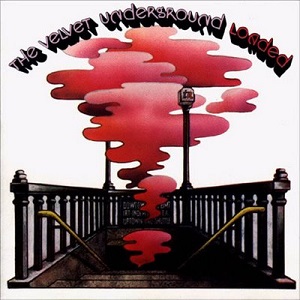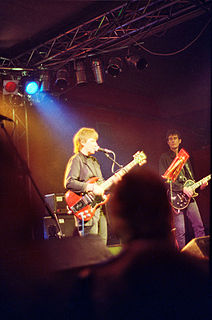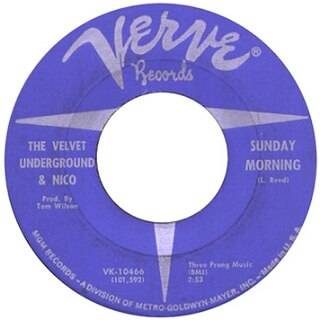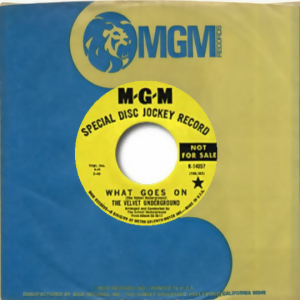
The Velvet Underground & Nico is the debut album by American rock band the Velvet Underground and German singer Nico, released in March 1967 by Verve Records. It was recorded in 1966 while the band were featured on Andy Warhol's Exploding Plastic Inevitable tour. The album features experimental performance sensibilities and controversial lyrical topics, including drug abuse, prostitution, sadomasochism and sexual deviancy. It sold poorly and was mostly ignored by contemporary critics, but later became regarded as one of the most influential albums in the history of popular music.

The Velvet Underground is the self-titled third studio album by American rock band the Velvet Underground. Released in March 1969, it was their first record with Doug Yule, who was a replacement for John Cale. Recorded in 1968 at TTG Studios in Hollywood, California, the album's sound—consisting largely of ballads and straightforward rock songs—marked a notable shift in style from the band's previous recordings. In 2003, Rolling Stone ranked The Velvet Underground at number 314 in its list of the 500 greatest albums of all time.

Loaded is the fourth studio album by American rock band the Velvet Underground, released in November 1970 by Atlantic Records' subsidiary label Cotillion. Despite having a number of singles originate from it, the album itself failed to chart.

Maureen Ann "Moe" Tucker is an American musician and singer best known for having been the drummer for the New York City-based rock band the Velvet Underground.

Holmes Sterling Morrison Jr. was an American guitarist, best known as one of the founding members of the rock group the Velvet Underground, usually playing electric guitar, occasionally bass guitar, and singing backing vocals.

Gold is a two-CD compilation album by the Velvet Underground. It was released for the North American market on June 14, 2005, by Polydor, the record label that oversees the band's Universal Music Group back catalogue.

Another View is an outtakes compilation album by the Velvet Underground. It was released in 1986 by Verve Records and is composed of material recorded between 1967 and 1969.

Final V.U. 1971–1973 is a box set by the Velvet Underground, comprising live recordings from after founding members Lou Reed and Sterling Morrison had left the group. It was released by Japanese record company Captain Trip Records in August 2001.

The Best of The Velvet Underground: Words and Music of Lou Reed is a compilation album by The Velvet Underground. It was released in October 1989 by Verve Records.

"Femme Fatale" is a song by American rock band the Velvet Underground from their 1967 debut album The Velvet Underground & Nico, with lead vocals by Nico.
"Heroin" is a song by the Velvet Underground, released on their 1967 debut album The Velvet Underground & Nico. Written by Lou Reed in 1964, the song, which overtly depicts heroin use and abuse, is one of the band's most celebrated compositions. Critic Mark Deming of Allmusic writes, "While 'Heroin' hardly endorses drug use, it doesn't clearly condemn it, either, which made it all the more troubling in the eyes of many listeners."

"I'm Waiting for the Man" is a song by the American rock band the Velvet Underground. Written by Lou Reed, it was first released on their 1967 debut album, The Velvet Underground & Nico.

"Sweet Jane" is a song by American rock band the Velvet Underground; it appears on their fourth studio album Loaded. The song was written by Lou Reed, the band's leader, who continued to incorporate the piece into live performances as a solo artist.

The ostrich guitar or ostrich tuning is a type of trivial tuning. It assigns one note to all strings, e.g. E-E-e-e-e'-e' or D-D-D-D-d'-d'. The term "ostrich guitar" was coined by the Velvet Underground's Lou Reed after the pre-Velvet Underground song "The Ostrich" by Lou Reed and the Primitives, on which he first recorded using this tuning, the first known commercial composition to make use of a trivial guitar tuning.

"I'll Be Your Mirror" is a song by the Velvet Underground and Nico. It appeared on their 1967 debut album The Velvet Underground & Nico. It also surfaced as a single a year earlier with "All Tomorrow's Parties" in 1966.

"There She Goes Again" is a song by The Velvet Underground. It first appeared on their 1967 debut album, The Velvet Underground & Nico. The syncopated guitar riff is taken from the 1962 Marvin Gaye song "Hitch Hike". Guitarist Sterling Morrison has stated:
Metronomically, we were a pretty accurate band. If we were speeding up or slowing down, it was by design. If you listen to the solo break on "There She Goes Again," it slows down—slower and slower and slower. And then when it comes back into the "bye-bye-byes" it's double the original tempo, a tremendous leap to twice the speed.
"Venus in Furs" is a song by the Velvet Underground, written by Lou Reed and originally released on the 1967 album The Velvet Underground & Nico. Inspired by the book of the same name by Leopold von Sacher-Masoch, the song includes sexual themes of sadomasochism, bondage and submission.

Fifteen Minutes: A Tribute to the Velvet Underground was an album released by Imaginary Records in the UK in 1994. The album consisted of contemporary artists performing cover versions of songs by the Velvet Underground. All the tracks had previously appeared on the three-volume Heaven & Hell series of covers of Velvet Underground tracks.

The Velvet Underground was an American rock band formed in New York City in 1964 by singer/guitarist Lou Reed, multi-instrumentalist John Cale, guitarist Sterling Morrison, and drummer Angus MacLise. The band was initially active between 1965 and 1973, and was briefly managed by the pop artist Andy Warhol, serving as the house band at the Factory and Warhol's Exploding Plastic Inevitable events from 1966 to 1967. Their debut album, The Velvet Underground & Nico, was released in 1967 to critical indifference and poor sales but has become critically acclaimed; in 2003, Rolling Stone called it the "most prophetic rock album ever made."

"What Goes On" is a song by the Velvet Underground. It was the only single released from their 1969 eponymous third album.















